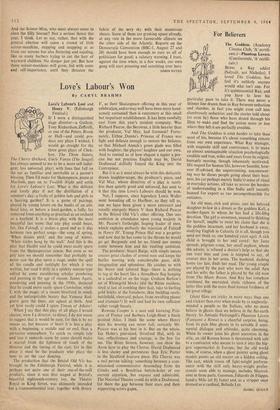For Believers
The Goddess. (Academy Cinema Club, 'A' certifi- cate.)—Phantom Lovers.
(Continentale, certifi- cate.) And The Goddess is even harder to take than most of his, because it's about something remote. from our own experience. What Ray manages, with exquisite skill and contrivance, is to make an almost unimaginable situation psychologically credible and true, miles and years from its origins; humanly moving, though inhumanly motivated. His respect for human life, however humble, how- ever ill-advised, the unpatronising, uncomment- ing way he shows people going about their busi- ness, his (or perhaps merely India's) sense of ritual in everyday actions, all take us across the borders of understanding in a film India until recently banned for export as too incomprehensible for outsiders.
An old man, rich and pious, sees his beloved daughter-in-law in a dream as the goddess Kali, a mother-figure to whom he has had a life-king devotion. The girl is seventeen, unused to thinking for herself, unable to resist his claim that she is the goddess incarnate, and her husband is away, studying English in Calcutta (it is all, though you need not think so, one hundred years ago). A sick child is brought to her and cured: her fame spreads, pilgrims come, her small nephew, whom she adores, is refused a doctor's help so that she can treat him and (one is tempted to say, of course) dies in her arms. The husband, dashing home too late, finds her mad. The young couple are played by the pair who were the adult Apu and his wife; the father, is played by the old man from The Music Room. And Ray has somehow combined the encrusted, static richness of the latter film with the more fluid human freshness of his great trilogy.
Ghost films are tricky in more ways than one and trickier than ever when made by as unghostly- minded a people as the Italians, who no more believe in ghosts than we believe in the flat-earth theory. So Antonio Pietrangeli's Phantom Lovers (Fantasmi a Roma) is a cheerful surprise, being, from its pale blue ghosts to its amiable if senti- mental dialogue and attitudes, quite charming. When its owner joins his ghost ancestors in the attic, an old Roman house is threatened with sale to a contractor who means to turn it into the big- gest supermarket in Europe; but the old world wins, of course, when a ghost painter using ghost models paints an old master on a hidden ceiling. The cast, which tosses off light-weight perform- ances with the skill only heavy-weight profes- sionals seem able to manage, includes Mastroi- anni in three parts, Gassman, Eduardo de Filippo, Sandra Milo (of 81 fame) and, as a stripper once dressed as a cardinal, Belinda Lee.
ISABEL QUIGLY






































 Previous page
Previous page